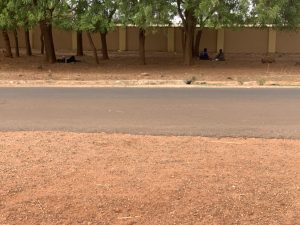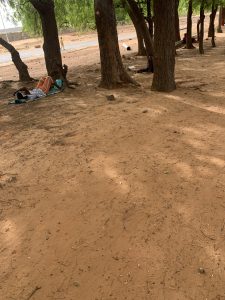By Habeeb Olokooba

Fatimah Lukman’s [Pseudonym] trouble began two months ago when she found herself struggling to read within the walls of any classroom. Despite her best efforts, the oppressive heat in the classrooms renders concentration nearly impossible– turning what should have been a safe learning environment into an insufferable ordeal.
“I later quit going to class and started following my friends to the bush to read,” she said.
The News Digest could gather that a considerable percentage of UDUS students have ceased reading in class and now opt for studying under the trees at the back of school hostels. The primary reasons are the current heatwave and the intermittent electricity supply.
Proximity, Cool Atmosphere
On a Saturday afternoon, amidst the radiant sun of the Caliphate, students were seen reading under the protective canopy of trees, directly across from the school stadium. Among them, two students sat face to face, completely focusing on their books, seemingly undisturbed by the surroundings when this reporter approached them. One need not be told that they are comfortable being that way.
Explaining why he preferred to read under the tree, Ishaku Augustine, a 100-level Nursing student, described the comfort and motivation it provided, which drew him there every day.
In his words: “The classrooms are not only hot but noisy. A lot of people that go to class don’t go there to read and such distraction is not good for people that are in class to read.”

According to Odunsanwo Hamzah, the other student, the heat is the main factor that drives him under the tree every day.
He said, “ The atmosphere in Sokoto is not friendly lately, and as you can see, the class will be hot considering the population reading there,” Hamzah explained.
“Even when there is electricity, the breeze from the fan is always hot. Sitting under the tree is the only alternative for most of us.”
Similarly, Sarah Samson, a master’s student of Parasitology, said aside from the cool atmosphere the shelterbelt is not far from her hostel, which was why she preferred it to the classroom.
Effect of Heatwave
The impact of the heatwave on the human body ranges from meningitis to rashes, itching, and so on. Thus the above are diseases that may warrant religious visits to the hospital. With Sokoto sun oscillating between 43.0 to 44.8, staying in classes that are not conducive is nothing close to being advisable. Hence compromising the tree alternative is not bad.
In Nigeria, the current heat wave is characterized by soaring temperatures, exacerbating discomfort and posing risks to human health and well-being. As Nigeria grapples with an intense heatwave, many believe that the implications for its people are far-reaching and demand urgent attention.
The primary causes of the heatwave in Nigeria, according to climate change experts, are multifaceted, with both natural and anthropogenic factors at play.
Hydration as Heat Management Strategy
According to Doctor Bala Sokoto, a health worker at Usmanu Danfodiyo University Sokoto clinic, staying hydrated always can be a good way to battle the heat.
“Avoiding a less conducive class is highly encouraged. Reading under the tree can be better but not the best,” Doctor Bala advised.
